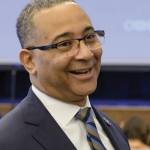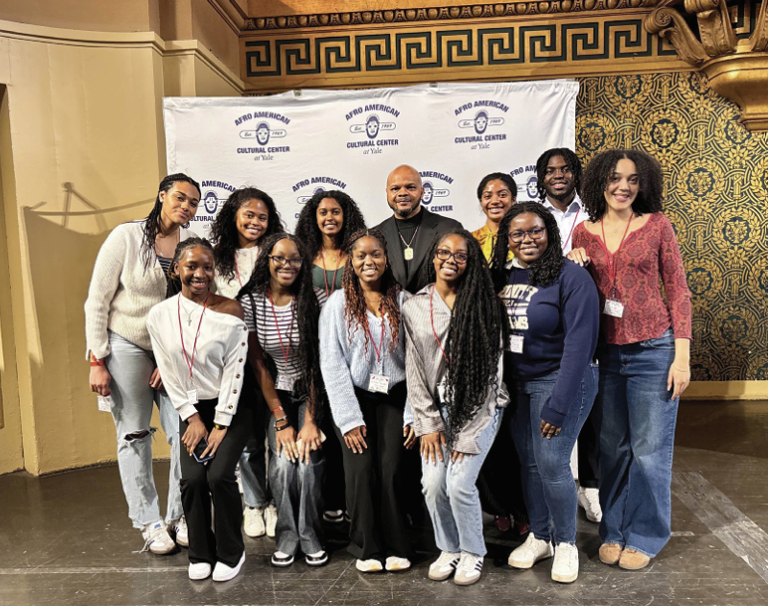Maliah Ryan ’25
Contributing Writer
Over the next month, university admissions officers across New England will review my graduate school applications, where I shared my personal growth, aspirations, and passion for a career in the public health field. While these officers do not know me personally, my essays offer a glimpse into my life, morals, and belief systems. This year, as a senior preparing to graduate, I find myself reflecting on how Trinity has shaped me into the person I am today and how I will remember the College. Throughout my four years at Trinity, I have met the most incredible professors, faculty, and friends. I will always be eternally grateful for my circle at Trinity and everyone who has supported me — but my feelings about the institution are more complicated.
Before I dive into that statement, let me take you back to the summer of 2023. Anna Grant-Bolton ’25 and Olivia Silvey ’25 pitched the idea of starting a divestment campaign, concerned that our school was falling behind its peer institutions in fossil fuel divestment; Middlebury, Williams, Amherst and over 100 other colleges and universities have already committed to divesting from fossil fuels. That summer, friends and campus activists alike were brought together and TrinDivests was off to the races. By October 2023, we officially launched a petition advocating for transparency and divestment from harmful industries including fossil fuels, mass incarceration, the military-industrial complex, and weapons manufacturing. By the semester’s end, the SGA had unanimously passed a referendum supporting divestment.
Yet, I believe that the College has turned its back on me and my fellow students. Why? Well, my answer is straightforward: Trinity refuses to disclose endowment investments and divest. As you may know, divestment is the opposite of investment, and for colleges and universities that invest in both private and public companies through endowments, divestment means eliminating those investments that are deemed unacceptable or inefficient. As of June 30, 2023, Trinity’s endowment stood at $791 million, invested in various sectors of the economy. According to the “Trinity College Endowment Report FY 2023”, Trinity outsources its endowment management to an asset manager called Commonfund for its indirect investments. This means Commonfund chooses vehicles to invest Trinity’s endowment in, which could be hedge funds, private equity, mutual funds, or cash in banks. As a result, Trinity money is allocated to other funds or managers; or individual corporations that may engage in irresponsible practices. So, when the administration claims that “Trinity has not directly invested in fossil fuels since 2018,” one cannot conclude that zero money is supporting destructive companies like Exxon. Indirect investments often funnel funds into these industries without transparency or accountability.
It is no secret that an endowment is a primary link between higher education and the global culture of growing inequality and insecurity. We can look toward historical examples of successful divestment cases, such as the students’ pressure on universities to divest in the face of South African apartheid. Ultimately, over 110 campuses successfully lobbied their colleges to take divestment actions against South Africa (note: Trinity finally divested in 1986). However, in the years since, I consider Trinity to have become increasingly influenced by the rise of neoliberalism, which was popularized during the Ronald Regan era. This ideology of molding higher education into businesses rather than being providers of knowledge is damaging, especially when students are being treated like customers, with profits being prioritized over ethical accountability. It is my hope that all students at Trinity recognize that university divestment is valuable. Why? Since most of us do not have a personal oil rig or coal mine situated in our backyard to shut down, divestment allows individuals to have a stake in powerful movements such as climate justice, anti-mass incarceration, and anti-war efforts. We, as students, have links to a huge amount of money through our college. Wouldn’t you agree that higher-ed institutions have a moral responsibility to adhere to ethical standards and to alleviate harm and oppression in the world?
According to a literature review published in the Peabody Journal of Education, “Divestment campaigns are tactics consistent with larger social justice movements focused on state-sanctioned racism, climate change, and economic exploitation”. The ultimate goal of divestment strategies is to enact social change. As students, we must acknowledge that money can perpetuate systems of inequality or be allocated to promote collective welfare. By divesting from harmful industries, institutions set a precedent of guaranteeing human rights while big companies get hit where it really hurts: their reputation. The implications of divestment as a political tactic are twofold: 1) highlight the necessity for college finances to be transparent and accountable, and 2) highlight an adversarial relationship between the campus community and the College’s governing body, often calling out an institution for its complicity in social issues. Divestment can ultimately alter social, environment, and political conditionals locally and abroad to dismantle systems of oppression.
With this in mind, when the Board of Trustees’ response to disclosure and divestment was shared via email from President Joanne Berger-Sweeney on Nov. 25, 2024, I could only sigh deeply and reproach the situation with my friends. Despite the acknowledgment of much of the support that our campus divestment initiatives have received since 2023, the Board rejected the possibility of a just and sustainable future for the Trinity community. Specifically, it stated, “Guided by its fiduciary responsibilities, the Board of Trustees has chosen not to change or revise the College’s investment policies.” The email continued by adding words about how geopolitics are not directly related to the core values of Trinity’s mission statement. This response from the College undermines the vast efforts advocates have done and will continue to do to demand divestment rooted in social justice principles. Trinity claims its mission is to support students to “grow into bold, independent thinkers who will transform our world for the better,” but unfortunately President Berger-Sweeney and the Board actively block that change. As an environmental science major, my classes have taught me to care deeply about the environment, to understand the far-reaching consequences of pollution, deforestation, and the climate crisis, and to trust in the power of science. But does Trinity truly care about me, its future or the values it instills in its students? How can the College claim to uphold sustainability and justice statements while (potentially) investing in oil companies that perpetuate environmental destruction and human suffering? This hypocrisy is why I am writing.
I see myself as a changemaker — and as a Trinity student, I bet you do too. I am an advocate for a more just and sustainable world. But what about Trinity’s identity? What kind of institution will it be known as? I strive to live by the values of advocacy and justice and I want Trinity to reflect those values. I want the College to align its identity with real, meaningful action, starting with divestment from injustices. This is how Trinity can shape its legacy.



+ There are no comments
Add yours